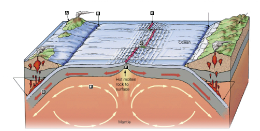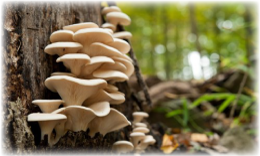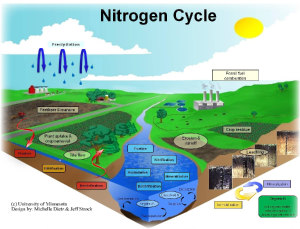|
SCIENCE AT THE BLEND
Physical Science & Ecology
 This year-long course is designed for students preparing for the advanced high-school-level sciences — e.g., chemistry and physics. It teaches students both vital information and scientific thinking. This year-long course is designed for students preparing for the advanced high-school-level sciences — e.g., chemistry and physics. It teaches students both vital information and scientific thinking.
Over two semesters, Physical Sciences & Ecology addresses a range of essential topics in earth science & geology, astronomy, and ecology, as well as a number of specific topics in physics and chemistry.
Among the specific topics covered:
- Physics:
- Thermal Energy and Thermodynamics
 Heat Transfer and Change of Phase Heat Transfer and Change of Phase- Waves and Sound
- Light
- Earth Science:
- Rocks and Minerals
- Plate Tectonics and Earth's Interior
- Shaping Earth's Surface
 Geologic Time—and Reading the Rock Record Geologic Time—and Reading the Rock Record- The Oceans, Atmosphere, and Climatic Effects
- Driving Forces of Weather
- Astronomy:
- The Solar System
- Stars and Galaxies
- The Structure of Space and Time
 Ecology: Ecology:
- Populations
- The Food Chain
- Fungi and other Decomposers
- Biomes
- Chemical Cycles: Water, Carbon and Nitrogen Cycles
- Humans and the Biosphere
 Chemistry: Chemistry:
- Atomic structure
- The Periodic Table & Representative Groups and Families — Sulfur, Halogen, Nitrogen, Metals
- Bonding
- Radioactivity
- Carbon and Organic Chemistry
This class will comprise two sessions per week:
- one 90-minute session on-site, held on Tuesdays at our location in Bethel, CT;
- a one-hour online class later in the week.
Tests will be provided to parents to administer at home as they wish: open-book, closed-book, as a learning tool, as a grade generator, or in some combination of these.
Texts to purchase
Here is the text needed for this course (with a link to the correct edition on Amazon):
Other materials needed. Your student will also need a "D" ring binder, with loose leaf paper and section dividers.
Students will be expected to complete approximately four hours of homework each week. Homework will consist of reading, annotating text, watching videos, completing worksheets, and studying.
Course fees
The fee for this two-semester course is $ 1340.
|
|
|
Our approach to ...
Science
Sciences at The Blend aim high. At the same time, we provide in-depth studies of the discipline for two kinds of students:
- those new to the formal study of science;
- those who have already studied science deeply for years.
Our courses employ high-quality texts, often college-level texts, as well as websites from universities, AP-level labs, and in-depth explorations. All content is taught by subject-matter experts who are passionate about their disciplines. In order to ensure learning and mastery of concepts, moreover, the content is taught in a tiered fashion — laying foundational concepts, building up and delving deep into the facts, and reinforcing by looping back to essential concepts covered earlier in the course.
These methods ensure that no student is left behind. Rather, students come away with a full picture of the science and the interconnectedness of topics. Students with more science acumen can learn deeply while students new to the discipline learn comprehensively.
A more detailed look at our methods:
- All courses are taught through class lectures, readings, video, images, animations, in-class note-taking sheets, worksheets, and beautiful printed materials depicting abstract concepts such as cellular activity, chemical compounds, biochemical and physical processes, etc.
- Students are assigned in-depth research projects to deepen their understanding of the history of science and the development of scientific knowledge. All students are required to present in class and online.
- Labs correlate to class content: 15 lab sessions, each including one or more labs. Students use the scientific method to analyze data and draw conclusions in written reports.
- Tests: 6–8 tests provided to parents to administer at home as they wish—open book, closed book, as a learning tool, as a grade generator, or any combination.
- Periodically our instructors give in-class quizzes.
- Homework: four to five hours of per week—reading, annotating text, watching videos, completing worksheets, doing independent research, writing lab reports, and studying.
[This instructor] runs a fantastic biology class. Her enthusiasm is readily passed on. The material can be challenging, but she takes the time to explain things in a way that the student understands, even on her own time before or after class. She uses a wide variety of printed materials, videos, PowerPoint slides—all together they paint a clear picture that really facilitates learning. I have found that my 13-year-old son had not just memorized the material but actually understood it. For instance, when he came across unfamiliar questions on a practice test, he was able to reason his way with confidence to the correct answers.
—Mom of 13-year-old son, homeschooler
|
|
![]()